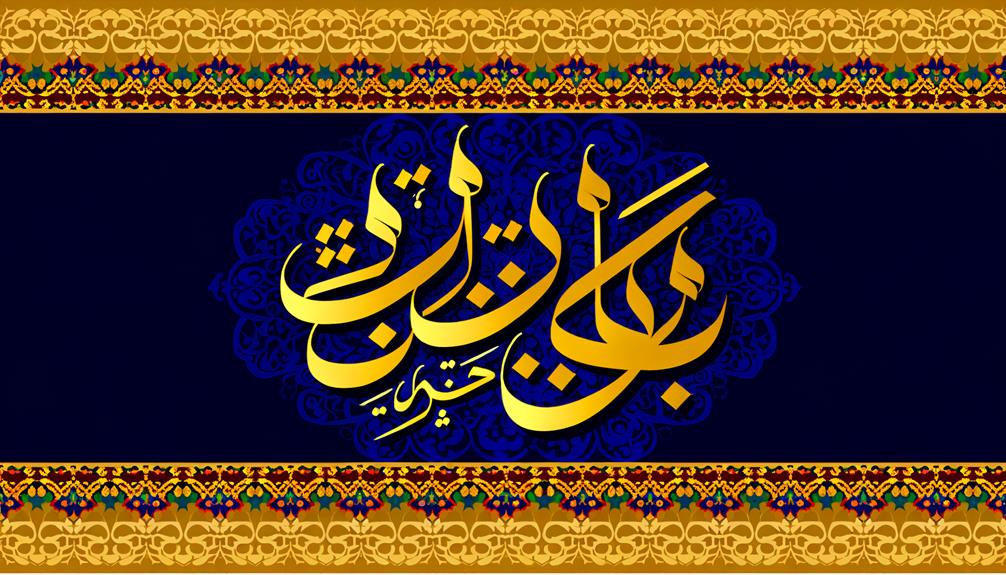Meaning of Name Nasir in Urdu
In Urdu, the name 'Nasir' (ناصر) means 'helper' or 'supporter.' It originates from the Arabic verb 'nasara,' which translates to 'assist.' This name is deeply woven into various cultures, symbolizing strength and support. With historical figures and scholars like Nasir Kazmi and Nasir al-Din al-Tusi, the name carries significant cultural and spiritual weight.
Nasir embodies the divine attributes of protection and moral strength, aligning with Islamic traditions of aiding truth and justice. If you're curious about its rich heritage and famous bearers, there's more to explore.

Key Takeaways
- The name 'Nasir' in Urdu means 'helper' or 'supporter'.
- 'Nasir' is written as ناصر in Urdu script.
- The name originates from the Arabic verb 'nasara', meaning 'to help' or 'to support'.
- In Urdu literature, 'Nasir' symbolizes strength and support.
- 'Nasir' carries spiritual significance, embodying divine assistance and protection.
Etymology of Nasir
The name Nasir, which originates from the Arabic language, means 'helper' or 'supporter.' You'll find that its etymology is rooted in the Arabic verb 'nasara,' which translates to 'to help' or 'to support.' This linguistic connection underscores the name's inherent sense of assistance and solidarity.
In Urdu, Nasir is written as ناصر, maintaining the phonetic integrity and meaning. By understanding this, you grasp not just the definition, but the linguistic journey the name has taken across cultures and languages.
It's fascinating how a single name can embody the essence of aid and support, resonating through different dialects and regions. So, when you encounter the name Nasir, you're seeing a legacy of linguistic and cultural continuity.
Cultural Significance
Exploring the cultural significance of the name Nasir, you'll find it deeply woven into the fabric of various societies, particularly in regions where Urdu and Arabic are prevalent. This name carries a weight of historical and social importance, often reflecting values and identities.
Historical Figures: Many notable leaders and scholars have borne the name Nasir, linking it to a legacy of wisdom and leadership.
Literary References: In Urdu literature, Nasir often symbolizes strength and support, adding poetic depth to its usage.
Community Roles: The name is commonly found among individuals who are seen as protectors or supporters within their communities, underscoring its meaning of 'helper' or 'defender.'
Understanding these aspects helps you appreciate the layers of significance behind the name Nasir.
Spiritual Connotations
How does the name Nasir resonate on a spiritual level in Urdu-speaking cultures?
The name Nasir, derived from Arabic, translates to 'helper' or 'protector' in Urdu.
Spiritually, it embodies the divine attribute of assistance and protection, often associated with God's guidance and support.
When you name someone Nasir, you invoke qualities of divine guardianship and moral strength.
In Islamic tradition, these attributes are highly revered, reflecting the individual's role as a supporter of truth and justice.
This spiritual resonance isn't merely symbolic; it actively shapes the cultural and personal identity of the bearer.
Historical Context
When you explore the historical context of the name Nasir, you'll find its origins deeply rooted in Arabic etymology, where it means 'helper' or 'protector.'
This name has held significant cultural importance across Islamic history, often associated with leaders and influential figures.
Understanding its historical resonance enriches your appreciation of its linguistic and cultural layers.
Etymology and Origins
The name 'Nasir' has its roots in Arabic and is historically significant in Islamic culture. Derived from the Arabic verb 'nasara,' it means 'to help' or 'to support.' This name has been prevalent in various regions and holds deep linguistic and cultural resonance.
Linguistic Roots: 'Nasir' originates from the triliteral root 'n-s-r' in Arabic, emphasizing help and victory.
Historical Usage: Many prominent Islamic figures and leaders have borne this name, highlighting its importance throughout history.
Geographical Spread: 'Nasir' is widely used in Muslim-majority countries, from the Middle East to South Asia, reflecting its cultural reach.
Understanding these aspects enriches your appreciation of the name's profound heritage.
Cultural Significance
Throughout history, the name 'Nasir' has symbolized support and victory, deeply embedding itself in the cultural fabric of Islamic societies. You'll find it in the annals of early Islamic history, where leaders and warriors bearing the name were often celebrated for their roles in pivotal battles and governance.
The name carries connotations of help and protection, reflecting its Arabic roots. It's not just a name but a title of honor and responsibility.
In Urdu-speaking communities, 'Nasir' resonates with the same reverence, often given to boys in hopes they'll embody these virtues. By choosing 'Nasir', you're connecting with a legacy of resilience, leadership, and unwavering support, reinforcing its cultural and historical significance in modern times.
Famous Personalities Named Nasir
Among the myriad of renowned individuals named Nasir, you'll find influential figures in fields ranging from literature to politics, each leaving a substantial cultural and historical impact. These personalities not only bear a name with profound meaning but also exemplify its essence through their accomplishments.
- Nasir Kazmi: An eminent Urdu poet, Nasir Kazmi's works are celebrated for their deep emotional resonance and linguistic beauty.
- Nasir al-Din al-Tusi: A Persian polymath, his contributions to astronomy and mathematics remain pivotal.
- Gamal Abdel Nasser: As the second President of Egypt, Nasser's leadership and policies notably reshaped the Middle East.
Each Nasir has contributed uniquely to their respective fields, underscoring the cultural richness embedded in their name.
Usage in Modern Times
In modern times, the name Nasir continues to be widely used, cherished for its rich linguistic heritage and profound meaning.
You'll find it prevalent in various cultures, especially within Muslim communities, where it signifies 'helper' or 'supporter' in Arabic.
This name's timeless appeal lies in its positive connotations and the ease with which it integrates into different languages and societies.
Parents often choose Nasir not only for its beautiful sound but also for its meaningful representation of assistance and protection.
The name's versatility extends to its use in both formal and informal contexts, demonstrating its enduring relevance.
Nasir in Literature
You'll find the name Nasir woven into the tapestry of literature, often symbolizing a character of strength and unwavering support. In Urdu literature, Nasir frequently embodies the role of a steadfast ally or a wise guide. This name carries a rich cultural significance and adds layers of meaning to the narratives.
Here are three notable examples:
- Nasir in Classical Poetry: Urdu poets have used Nasir to denote a noble protector, adding depth to their verses.
- Nasir in Modern Novels: Contemporary authors often name their resilient protagonists Nasir, reinforcing the character's dependable nature.
- Nasir in Folktales: Traditional stories leverage the name to depict heroes who provide guidance and support to the main characters.
Understanding these contexts enriches your appreciation of the name Nasir in Urdu literature.
Variations and Nicknames
Beyond its literary significance, the name Nasir also boasts a variety of intriguing variations and affectionate nicknames in Urdu. Nasir can be affectionately shortened to Nasi or Nas for a more casual and endearing feel. Additionally, the meaning of Salar in Urdu is “leader” or “commander,” adding another layer of depth and significance to the name Nasir. It is no wonder that this name has gained popularity not just for its literary significance, but also for its rich cultural connotations and versatile variations.
Common variations include 'Nasiruddin,' meaning 'Defender of the Faith,' and 'Nasir Ali,' merging it with another popular name. These variations often reflect cultural and religious contexts.
You might encounter nicknames like 'Nasi' or 'Nas' that add a personal, endearing touch. Linguistically, these diminutives soften the formal tone of 'Nasir,' making it more intimate.
Understanding these variations and nicknames not only enriches your grasp of the name but also offers insights into the cultural nuances of Urdu-speaking communities. These subtle shifts in form and meaning highlight the depth and flexibility of the Urdu language. For example, the name “Asher” has variations such as “Ashir” and “Ashar” which all carry different connotations. Understanding the meaning of the name “Asher” in Urdu and its variations can provide greater understanding of the cultural significance placed on names within Urdu-speaking communities. The meaning of asher name in Urdu can vary depending on the specific phonetic interpretation and cultural context.
Conclusion
Fascinatingly, you might find that the name Nasir, rich in cultural, spiritual, and historical significance, could pop up in unexpected places.
Whether you're diving into Urdu literature or meeting someone new, Nasir carries a sense of protection and support.
Its variations and nicknames add layers of meaning, making it a name that transcends time and place.
So next time you encounter it, you'll appreciate the deep roots and multifaceted nature behind this powerful name.






